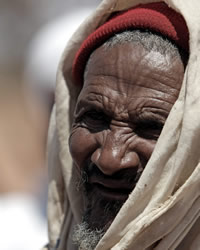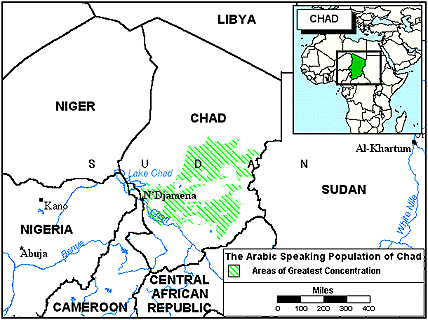Arabs are among the world's largest and most rapidly growing ethnic groups. They are divided into thousands of groups, based on their Muslim sect, Arabic dialect and regional setting. They live in mountains, in valleys, in deserts, on seacoasts and in villages or cities.
In the seventh and eleventh centuries, Arabs invaded North Africa, causing many tribes and nomadic groups to be displaced. To some extent, these invasions also absorbed communities of black farmers, Jewish artists, and Berber refugees. As a result, many different Arab groups now exist throughout North Africa.
Turku Arabs live across the border from Sudan and share the same lifestyle as that of the Arabized tribes in the area. They live in hot, dry villages. Their language, Pidgin Arabic, is a Creole form of Arabic.
Turku Arabs are dependent on farming and animal production for their livelihoods. Agriculture is the basis of the economy. Sorghum and millet are their staple crops, but they also grow watermelons, gourds, okra, sesame, and cotton. Turku Arabs also raise cattle, sheep, goats, donkeys and dogs. They make cheese and butter from either cow or goat milk.
Some Turku Arabs rely on nomadic herding for their livelihood, traveling with their herds of cattle or camels to better grazing lands and water sources. This reflects the continuance of Arab traditional culture, which first emerged in the deserts among people known as Bedouins, or desert nomads. Other Turku Arabs are successful businessmen and merchants. They are deeply involved in the commercial activities of the cities in their region.
Most Turku Arabs are poor farmers who live in permanent settlements or villages in rural areas. Their houses are simple, round dwellings with grass-thatched roofs. The nomadic groups live in temporary camps, seasonally migrating with their herds. They live in portable dome-shaped shelters made of branches covered with grass. The few Turku Arab businessmen and merchants who reside in the cities, however, live in rectangular houses with tin roofs.
Turku Arabs dress much like other Arabs. Long-sleeved cotton tunics, or djellabas, are worn with sandals and cotton turbans or caps.
The birth of children, especially boys, is cause for celebration among Turku Arabs. The first word a baby hears is the word "Allah" whispered in its ear. From an early age, boys go to the fields to help their fathers and older brothers with cultivation. They are taught by their fathers to obey and respect older males. Girls help their mothers cook and help care for the younger children.
Life for Turku Arabs centers around important ceremonies, such as birth, marriage and death. For boys, the first haircut and circumcision are also important rituals. The most elaborate of all ceremonies is the wedding. Some men have more than one wife, but under Islamic law they cannot have more than four. After marriage, a couple generally lives near the husband's parents; however, in some first marriages, a young couple lives with the wife's family until after the birth of their first child.
Turku Arabs are completely Muslim, following the teachings of the prophet Mohammed, as written in the Koran (Islam's holy book). They pray at the local mosques five times a day and follow all the Islamic ceremonies and laws.
An overwhelming majority of Turku Arabs have never had an opportunity to hear a clear presentation of the gospel. Intense prayer is needed to loosen the stronghold of Islam that is on their lives.
Printed Bible portions, audio and visual resources are available in the Juba Arabic spoken language of Turku Arabic in Chad; however, they have not yet had the advantage of understanding the good news of the gospel.
Ask the Lord to send laborers who can minister to Turkic Arabs in Chad in culturally relevant ways.
Pray that evangelical materials will soon be translated into their language. Ask the Holy Spirit to soften the hearts of Turku Arab leaders and family heads toward Christ.
Ask the Lord to save key leaders among Turku Arabs who will openly declare Jesus as Lord, and influence others.
Ask God to raise up prayer teams who will begin breaking up the soil through worship and intercession.
Pray that strong families and churches will be raised up among Turku Arabs in Chad.
Scripture Prayers for the Arab, Turku in Chad.
| Profile Source: Joshua Project |











